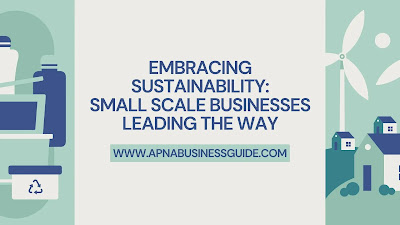Embracing Sustainability:
Small Scale Businesses Leading the Way
In recent years, the global discourse surrounding sustainability has escalated, driven by growing concerns over environmental degradation, social inequality, and economic instability. While large corporations have garnered significant attention for their sustainability efforts, it's the small scale businesses that often fly under the radar, quietly implementing innovative practices that prioritize the planet and its people. In this article, we'll delve into the realm of small scale businesses and explore how they are championing sustainable practices to make a big impact on our world.
Understanding Small Scale Businesses:
Small scale businesses, often referred to as SMEs (Small and Medium-sized Enterprises), constitute a significant portion of the global economy. These enterprises typically have fewer employees, lower revenue, and operate on a smaller scale compared to large corporations. However, their size does not diminish their potential influence on sustainability.
Why Sustainability Matters:
Sustainability in business refers to the integration of environmental, social, and economic considerations into decision-making processes. Embracing sustainability is no longer just a moral imperative; it's a strategic necessity. Small scale businesses recognize that sustainable practices not only benefit the planet and society but also contribute to long-term business success. Here's how:
1. Environmental Impact Reduction:
Small scale businesses are finding creative ways to minimize their environmental footprint. From implementing energy-efficient technologies to reducing waste generation, these enterprises are leading by example. For instance:
Energy Efficiency:
Many small businesses are investing in energy-efficient lighting, appliances, and HVAC systems to reduce energy consumption and lower their carbon emissions.
Waste Reduction:
Whether it's through composting organic waste, recycling materials, or repurposing packaging, small scale businesses are finding innovative ways to minimize waste generation and divert materials from landfills.
Sustainable Sourcing:
Some businesses prioritize sourcing materials and ingredients from local suppliers or those with sustainable practices, reducing transportation emissions and supporting local economies.
2. Community Engagement:
Small scale businesses often have deep roots in their local communities, allowing them to foster meaningful connections and make a positive impact on society. Through various initiatives, these businesses engage with their communities to address social issues and promote well-being. Examples include:
Community Outreach:
Small businesses frequently participate in community events, sponsor local initiatives, and donate to charitable causes, strengthening bonds with residents and demonstrating a commitment to social responsibility.
Employment Opportunities:
By providing jobs and training opportunities, small scale businesses contribute to economic development and empower individuals, particularly in underserved communities.
Education and Awareness:
Many small businesses use their platforms to educate consumers about sustainability issues and promote eco-friendly behaviors, inspiring positive change on a grassroots level.
YOU MAY LIKE THIS:
3. Financial Resilience:
Sustainability is not just about environmental and social responsibility; it also makes good business sense. Small scale businesses that embrace sustainability often enjoy financial benefits, including cost savings, improved brand reputation, and enhanced competitiveness. Here's how sustainability contributes to financial resilience:
Cost Savings:
By adopting energy-efficient practices, reducing waste, and optimizing resource use, small businesses can lower operating costs and improve profitability over time.
Brand Reputation:
Consumers are increasingly seeking out businesses that align with their values, including sustainability. Small scale businesses that prioritize sustainability can attract and retain customers, enhancing their brand reputation and loyalty.
Competitive Advantage:
Sustainability can differentiate small businesses in crowded markets, giving them a competitive edge and opening up new opportunities for growth and innovation.
4. Innovation and Adaptability:
Small scale businesses are nimble and agile, allowing them to quickly adapt to changing market conditions and embrace innovative solutions. Sustainability often drives innovation, prompting businesses to develop new products, services, and business models that are environmentally friendly and socially responsible. Examples include:
Product Innovation:
Small businesses are introducing eco-friendly alternatives, such as biodegradable packaging, reusable products, and sustainable fashion, catering to consumers' growing demand for sustainable options.
Technology Adoption:
From renewable energy systems to digital platforms for remote work and collaboration, small scale businesses are leveraging technology to enhance efficiency, reduce environmental impact, and adapt to evolving business needs.
Collaborative Partnerships:
Small businesses are forming partnerships and alliances with like-minded organizations, sharing resources, expertise, and best practices to amplify their sustainability efforts and achieve collective impact.
HELPFUL VIDEO:
Conclusion:
Small scale businesses play a vital role in driving sustainability and fostering positive change in our society. Through their innovative practices, community engagement, and commitment to environmental stewardship, these enterprises are demonstrating that sustainability is not just a lofty ideal but a tangible reality that can be achieved, one small step at a time. As consumers, investors, and policymakers increasingly prioritize sustainability, small scale businesses are poised to lead the way toward a brighter, more sustainable future for all.
image source:yahoo.com
 |
Small business |
ARTICLE RELATED
sustainability, embracing innovation, dealing with change, parley for the oceans, infrastructure maturity model embracing digital transformation episode 5,sustainable business,1% for the planet, real estate training, real estate coaching, business roundtable, real estate marketing, university of iowa college of public health, embry riddle aeronautical university, sustainable development goals, real estate industry, business management, apparel textile sourcing canada.






.webp)











